Tirthak Patel
Three Birds with One Stone: Improving Performance, Convergence, and System Throughput with Nest
Oct 10, 2025Abstract:Variational quantum algorithms (VQAs) have the potential to demonstrate quantum utility on near-term quantum computers. However, these algorithms often get executed on the highest-fidelity qubits and computers to achieve the best performance, causing low system throughput. Recent efforts have shown that VQAs can be run on low-fidelity qubits initially and high-fidelity qubits later on to still achieve good performance. We take this effort forward and show that carefully varying the qubit fidelity map of the VQA over its execution using our technique, Nest, does not just (1) improve performance (i.e., help achieve close to optimal results), but also (2) lead to faster convergence. We also use Nest to co-locate multiple VQAs concurrently on the same computer, thus (3) increasing the system throughput, and therefore, balancing and optimizing three conflicting metrics simultaneously.
ResQ: A Novel Framework to Implement Residual Neural Networks on Analog Rydberg Atom Quantum Computers
Jun 26, 2025Abstract:Research in quantum machine learning has recently proliferated due to the potential of quantum computing to accelerate machine learning. An area of machine learning that has not yet been explored is neural ordinary differential equation (neural ODE) based residual neural networks (ResNets), which aim to improve the effectiveness of neural networks using the principles of ordinary differential equations. In this work, we present our insights about why analog Rydberg atom quantum computers are especially well-suited for ResNets. We also introduce ResQ, a novel framework to optimize the dynamics of Rydberg atom quantum computers to solve classification problems in machine learning using analog quantum neural ODEs.
Quorum: Zero-Training Unsupervised Anomaly Detection using Quantum Autoencoders
Apr 17, 2025
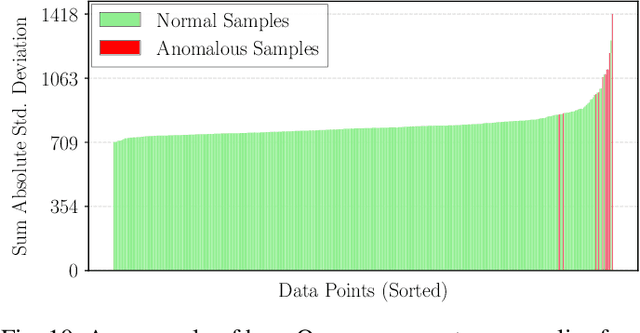
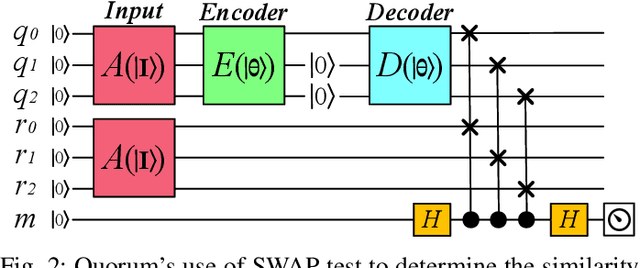
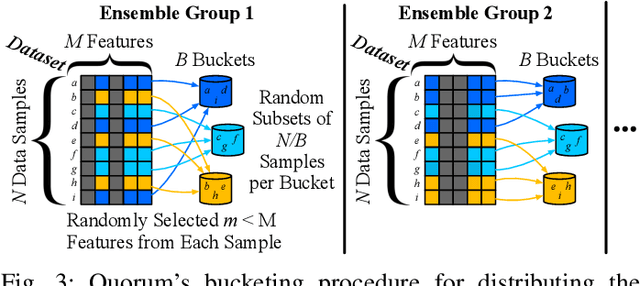
Abstract:Detecting mission-critical anomalous events and data is a crucial challenge across various industries, including finance, healthcare, and energy. Quantum computing has recently emerged as a powerful tool for tackling several machine learning tasks, but training quantum machine learning models remains challenging, particularly due to the difficulty of gradient calculation. The challenge is even greater for anomaly detection, where unsupervised learning methods are essential to ensure practical applicability. To address these issues, we propose Quorum, the first quantum anomaly detection framework designed for unsupervised learning that operates without requiring any training.
EnQode: Fast Amplitude Embedding for Quantum Machine Learning Using Classical Data
Mar 18, 2025Abstract:Amplitude embedding (AE) is essential in quantum machine learning (QML) for encoding classical data onto quantum circuits. However, conventional AE methods suffer from deep, variable-length circuits that introduce high output error due to extensive gate usage and variable error rates across samples, resulting in noise-driven inconsistencies that degrade model accuracy. We introduce EnQode, a fast AE technique based on symbolic representation that addresses these limitations by clustering dataset samples and solving for cluster mean states through a low-depth, machine-specific ansatz. Optimized to reduce physical gates and SWAP operations, EnQode ensures all samples face consistent, low noise levels by standardizing circuit depth and composition. With over 90% fidelity in data mapping, EnQode enables robust, high-performance QML on noisy intermediate-scale quantum (NISQ) devices. Our open-source solution provides a scalable and efficient alternative for integrating classical data with quantum models.
Qompose: A Technique to Select Optimal Algorithm- Specific Layout for Neutral Atom Quantum Architectures
Sep 29, 2024Abstract:As quantum computing architecture matures, it is important to investigate new technologies that lend unique advantages. In this work, we propose, Qompose, a neutral atom quantum computing framework for efficiently composing quantum circuits on 2-D topologies of neutral atoms. Qompose selects an efficient topology for any given circuit in order to optimize for length of execution through efficient parallelism and for overall fidelity. our extensive evaluation demonstrates the Qompose is effective for a large collection of randomly-generated quantum circuits and a range of real-world benchmarks including VQE, ISING, and QAOA.
OrganiQ: Mitigating Classical Resource Bottlenecks of Quantum Generative Adversarial Networks on NISQ-Era Machines
Sep 29, 2024Abstract:Driven by swift progress in hardware capabilities, quantum machine learning has emerged as a research area of interest. Recently, quantum image generation has produced promising results. However, prior quantum image generation techniques rely on classical neural networks, limiting their quantum potential and image quality. To overcome this, we introduce OrganiQ, the first quantum GAN capable of producing high-quality images without using classical neural networks.
ReCon: Reconfiguring Analog Rydberg Atom Quantum Computers for Quantum Generative Adversarial Networks
Aug 23, 2024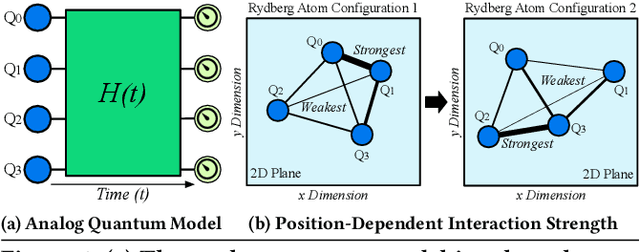
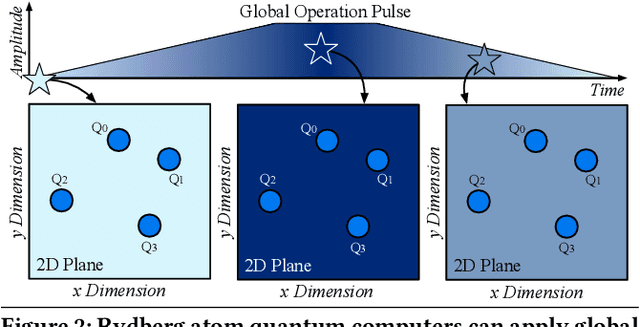

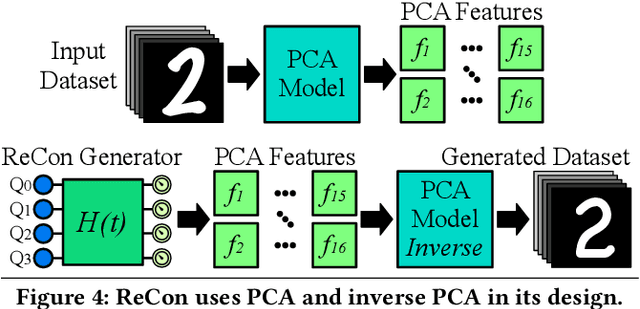
Abstract:Quantum computing has shown theoretical promise of speedup in several machine learning tasks, including generative tasks using generative adversarial networks (GANs). While quantum computers have been implemented with different types of technologies, recently, analog Rydberg atom quantum computers have been demonstrated to have desirable properties such as reconfigurable qubit (quantum bit) positions and multi-qubit operations. To leverage the properties of this technology, we propose ReCon, the first work to implement quantum GANs on analog Rydberg atom quantum computers. Our evaluation using simulations and real-computer executions shows 33% better quality (measured using Frechet Inception Distance (FID)) in generated images than the state-of-the-art technique implemented on superconducting-qubit technology.
QUILT: Effective Multi-Class Classification on Quantum Computers Using an Ensemble of Diverse Quantum Classifiers
Sep 26, 2023



Abstract:Quantum computers can theoretically have significant acceleration over classical computers; but, the near-future era of quantum computing is limited due to small number of qubits that are also error prone. Quilt is a framework for performing multi-class classification task designed to work effectively on current error-prone quantum computers. Quilt is evaluated with real quantum machines as well as with projected noise levels as quantum machines become more noise-free. Quilt demonstrates up to 85% multi-class classification accuracy with the MNIST dataset on a five-qubit system.
SLIQ: Quantum Image Similarity Networks on Noisy Quantum Computers
Sep 26, 2023Abstract:Exploration into quantum machine learning has grown tremendously in recent years due to the ability of quantum computers to speed up classical programs. However, these efforts have yet to solve unsupervised similarity detection tasks due to the challenge of porting them to run on quantum computers. To overcome this challenge, we propose SLIQ, the first open-sourced work for resource-efficient quantum similarity detection networks, built with practical and effective quantum learning and variance-reducing algorithms.
MosaiQ: Quantum Generative Adversarial Networks for Image Generation on NISQ Computers
Aug 22, 2023Abstract:Quantum machine learning and vision have come to the fore recently, with hardware advances enabling rapid advancement in the capabilities of quantum machines. Recently, quantum image generation has been explored with many potential advantages over non-quantum techniques; however, previous techniques have suffered from poor quality and robustness. To address these problems, we introduce, MosaiQ, a high-quality quantum image generation GAN framework that can be executed on today's Near-term Intermediate Scale Quantum (NISQ) computers.
 Add to Chrome
Add to Chrome Add to Firefox
Add to Firefox Add to Edge
Add to Edge